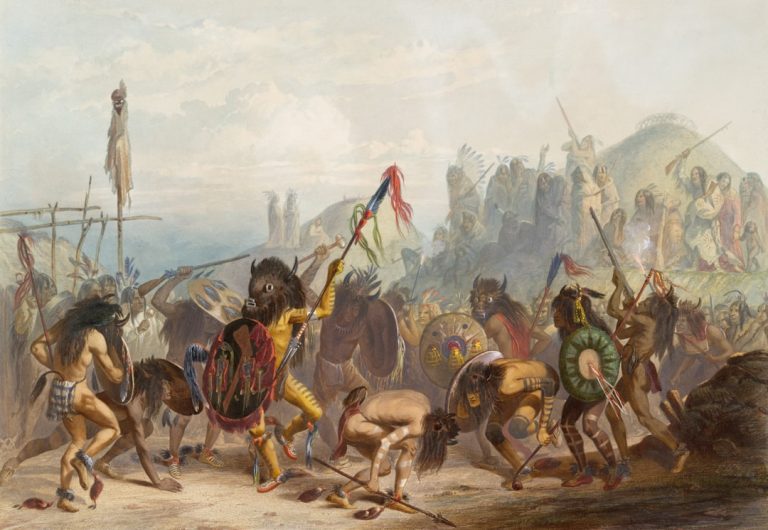
Cormac McCarthy’s “The Road” is a haunting narrative that delves into the depths of human experience in a post-apocalyptic world. The novel, published in 2006, presents a stark and desolate landscape where survival is a daily struggle, and hope is a fragile ember flickering against overwhelming darkness. McCarthy’s prose is characterized by its sparse yet poetic style, which mirrors the bleakness of the environment and the emotional weight carried by its characters.
The story follows a father and his young son as they navigate this ravaged world, facing not only the physical challenges of survival but also the psychological toll of their circumstances. Set in an unspecified future where civilization has collapsed, “The Road” paints a grim picture of humanity’s potential for destruction. The landscape is marked by ash, charred trees, and the remnants of a once-thriving society, now reduced to ruins.
This backdrop serves as a powerful metaphor for the fragility of life and the tenuous nature of hope. As readers journey alongside the father and son, they are invited to reflect on the essence of humanity, the bonds that connect us, and the moral dilemmas that arise when society’s structures disintegrate. McCarthy’s exploration of these themes resonates deeply, prompting questions about what it means to be human in a world stripped of its comforts and certainties.
Key Takeaways
- The Road is a post-apocalyptic novel that explores themes of survival, hope, and the human spirit in a desolate landscape.
- The father-son relationship is central to the story, highlighting the importance of love, protection, and resilience in the face of adversity.
- The novel portrays the harsh realities of a post-apocalyptic world, including scarcity of resources, danger, and moral ambiguity.
- Resilience and adaptability are crucial for survival in the novel, as characters must constantly navigate and overcome challenges.
- The Road delves into the role of morality and ethics in a lawless world, prompting readers to consider the complexities of human nature and behavior.
Themes of Survival and Hope
Survival is the central theme that permeates “The Road,” manifesting in both physical and emotional dimensions. The father and son are constantly on the move, scavenging for food, shelter, and safety in a world where resources are scarce and danger lurks at every turn. Their journey is fraught with peril, as they encounter not only the harsh elements but also other survivors who may pose a threat.
This relentless struggle for survival underscores the instinctual drive to persevere against overwhelming odds. The father’s determination to protect his son becomes a testament to parental love and the lengths one will go to ensure the safety of their loved ones. Amidst this bleak landscape, hope emerges as a fragile yet vital force.
The father often reminds his son that they must “carry the fire,” a symbol of hope and humanity that they must protect at all costs. This metaphorical fire represents not only their will to survive but also their commitment to maintaining their moral compass in a world that has largely abandoned ethical considerations. The father’s unwavering belief in the possibility of a better future serves as a beacon for both characters, illuminating their path through despair.
Even in moments of profound darkness, such as when they face starvation or encounter violence, the bond between them fuels their hope, suggesting that love can endure even in the most harrowing circumstances.
The Father-Son Relationship

At the heart of “The Road” lies the profound relationship between the father and son, which serves as both a source of strength and vulnerability. Their bond is characterized by deep affection and mutual dependence, illustrating the complexities of parental love in extreme conditions. The father’s role as protector is paramount; he is willing to make unimaginable sacrifices to ensure his son’s safety and well-being.
This dynamic creates an emotional anchor for both characters, providing them with purpose amidst chaos. The father’s fierce dedication to his son highlights the instinctual drive to nurture and safeguard future generations, even when faced with insurmountable challenges. Conversely, the son represents innocence and hope for renewal in a world that has lost its way.
His unwavering belief in goodness serves as a counterbalance to his father’s more pragmatic worldview. While the father often grapples with despair and cynicism about humanity’s fate, the son embodies an innate optimism that challenges his father’s darker inclinations. This interplay between their perspectives enriches the narrative, illustrating how love can inspire resilience even when confronted with overwhelming adversity.
Their relationship becomes a microcosm of humanity itself—fragile yet enduring, marked by both tenderness and tension as they navigate their harrowing reality together.
The Harsh Realities of the Post-Apocalyptic World
| Harsh Realities | Metrics |
|---|---|
| Scarcity of resources | Food, water, medicine, fuel |
| Survival challenges | Extreme weather, dangerous wildlife, hostile groups |
| Health risks | Disease, injuries, lack of medical care |
| Mental stress | Isolation, loss of loved ones, uncertainty |
| Conflict and violence | Competition for resources, power struggles, lawlessness |
The post-apocalyptic setting of “The Road” is not merely a backdrop; it is an integral component that shapes the characters’ experiences and decisions. McCarthy meticulously crafts a world devoid of color and life, where ash blankets the ground and remnants of civilization lie in ruins. This desolation serves as a constant reminder of what has been lost—a stark contrast to the vibrant world that once existed.
The harsh realities they face include scarcity of food, exposure to brutal weather conditions, and threats from other survivors who have resorted to cannibalism as a means of survival. These elements create an atmosphere of pervasive dread, emphasizing the fragility of existence in such dire circumstances. Moreover, McCarthy’s portrayal of this world raises questions about human nature when stripped of societal norms.
The characters they encounter often embody desperation and moral decay, reflecting how extreme conditions can lead individuals to abandon their humanity. The father’s encounters with other survivors reveal the spectrum of human behavior in crisis—some exhibit kindness while others resort to violence and betrayal. This duality underscores the complexity of morality in a lawless environment, challenging readers to consider how far they might go to survive when faced with similar circumstances.
The relentless struggle against these harsh realities serves as a crucible for both characters, testing their resolve and shaping their understanding of what it means to be human.
The Importance of Resilience and Adaptability
Resilience emerges as a crucial theme throughout “The Road,” highlighting the characters’ ability to endure despite overwhelming adversity. The father exemplifies this trait through his relentless determination to protect his son and find sustenance in an unforgiving landscape. His resourcefulness is evident as he devises strategies for scavenging food and finding shelter while navigating threats from other survivors.
This adaptability is not merely about physical survival; it also encompasses emotional resilience as he grapples with despair and loss while striving to maintain hope for his son’s future.
His curiosity about the world around him serves as a reminder that even in dire circumstances, there are glimmers of joy to be found.
For instance, moments spent sharing stories or simply walking together become precious memories that fortify their bond against external threats.
The Role of Morality and Ethics in a Lawless World

In “The Road,” McCarthy delves into complex moral questions that arise in a world devoid of societal structure. As civilization crumbles, traditional ethical frameworks disintegrate, leaving individuals to navigate their own moral compasses amidst chaos. The father grapples with these dilemmas as he encounters other survivors who have resorted to barbaric means for survival.
His internal conflict reflects a broader commentary on human nature—how desperation can lead individuals to compromise their values or abandon them altogether. The father’s commitment to instilling moral principles in his son becomes paramount in this lawless environment. He emphasizes the importance of maintaining their humanity despite external pressures to conform to brutality.
Phrases like “carry the fire” serve as guiding principles for both characters, reinforcing their shared values even when faced with morally ambiguous situations. This struggle between survival instincts and ethical considerations raises profound questions about what it means to be human when societal norms collapse. McCarthy invites readers to reflect on their own moral beliefs and how they might hold up under extreme duress.
Finding Meaning and Purpose in a Desolate Landscape
Amidst the bleakness of “The Road,” McCarthy explores the quest for meaning and purpose in a world stripped of its former vibrancy. The father’s journey is not solely about physical survival; it is also an existential search for significance in an environment that seems devoid of hope. His relationship with his son becomes a focal point for this search—through caring for him, he finds purpose even when faced with despair.
Their shared experiences become imbued with meaning as they navigate challenges together, transforming mundane moments into profound connections. The son’s innocence further complicates this search for meaning; he often expresses wonder at small things—a glimpse of beauty amidst devastation or moments spent together—reminding his father that joy can exist even in darkness. This interplay between despair and hope illustrates how meaning can be derived from relationships rather than external circumstances.
McCarthy suggests that even in desolation, individuals can forge connections that provide purpose and fulfillment, challenging readers to consider how they might find meaning in their own lives amidst adversity.
The Road as a Reflection of Human Nature and the Human Spirit
Ultimately, “The Road” serves as a poignant reflection on human nature and the resilience of the human spirit in the face of overwhelming adversity. McCarthy’s portrayal of the father-son relationship encapsulates both vulnerability and strength—demonstrating how love can endure even when surrounded by chaos. Their journey through a ravaged landscape becomes emblematic of humanity’s struggle against despair, illustrating that hope can persist even when all seems lost.
The novel invites readers to confront uncomfortable truths about human nature—our capacity for both compassion and cruelty—and challenges them to reflect on what it means to be truly human in extreme circumstances. Through vivid imagery and evocative prose, McCarthy captures the essence of survival while emphasizing the importance of maintaining one’s humanity amidst chaos. In doing so, “The Road” transcends its narrative boundaries, becoming a powerful meditation on existence itself—a testament to our enduring spirit even when faced with unimaginable challenges.
If you are a fan of Cormac McCarthy’s novel “The Road,” you may also be interested in exploring the use of poetic devices in literature. Understanding poetry and its various techniques can enhance your appreciation for McCarthy’s haunting and lyrical prose. Check out this article on poetic devices to delve deeper into the world of literary analysis and interpretation.
FAQs
Who is Cormac McCarthy?
Cormac McCarthy is an American novelist, playwright, and screenwriter. He is known for his dark and gritty writing style, as well as his exploration of themes such as violence, morality, and the human condition.
What is “The Road” about?
“The Road” is a post-apocalyptic novel that follows the journey of a father and his young son as they navigate a desolate and dangerous landscape. The novel explores themes of survival, love, and the resilience of the human spirit in the face of extreme adversity.
When was “The Road” published?
“The Road” was published in 2006.
Has “The Road” won any awards?
Yes, “The Road” won the Pulitzer Prize for Fiction in 2007.
Is “The Road” part of a series?
No, “The Road” is a standalone novel and is not part of a series.
Has “The Road” been adapted into a film?
Yes, “The Road” was adapted into a film in 2009, directed by John Hillcoat and starring Viggo Mortensen and Kodi Smit-McPhee.






